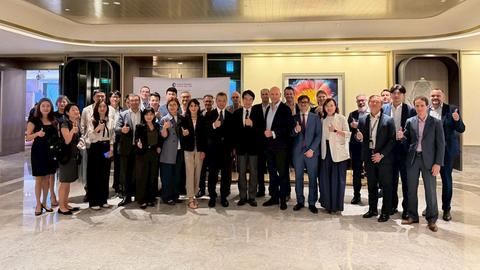
Members
Discover Our Members From The Foods & Beverage Sector
Feeling stressed while working from home? Missing those good times of eating in restaurants? Don't worry! Check out the list of our F&B members and...

Members
Feeling stressed while working from home? Missing those good times of eating in restaurants? Don't worry! Check out the list of our F&B members and...

Actualités
We recently organized the final CFO Club meeting of the year at the Pernod Ricard offices. We are grateful to all who joined us.

Actualités
On December 4, the ESG Club gathered at L’Oréal Taiwan’s office for a session dedicated to “Biodiversity – Public & Private Sector Collaboration.”

Actualités
On December 3, the HR Club gathered at EDF Power Solutions in Taipei for a session dedicated to Talent Retention Program – Best Practice Sharing.

Actualités
CALLING: Lucky draw winners to redeem before November 28th! ⏳ Present your lucky draw ticket if your number matches any of these and contact us 🤝🏻 ...

Actualités
The Beaujolais Nouveau celebrates freshly-produced wine from the Beaujolais region. As per tradition, the event was hosted the evening on the third...

Actualités
Towards a Safer, More Inclusive, and Resilient Labor Market Luncheon with Taiwan’s Minister of Labor

Actualités
On Saturday, October 25, the streets of Taipei came alive with color, music, and unity as over 150,000 people gathered to celebrate the 23rd edition...

Actualités
Rendez-vous with Minister Yi-Jing Lin: Building Taiwan’s Future Through Innovation and AI The French Chamber Taiwan had the honor of hosting a...

Actualités
We did it! Last week, we gathered over 60 people for World Cleaningup Day. Dedicated to cleaning up Longmen Beach in New Taipei City Gongliao ,...

Actualités
CSR Award Party: Celebrating Collaboration, Purpose, and Global Impact 🌏💚 The CSR Award Party held at VAVIN 酒盒子 marked a meaningful conclusion to...

Actualités
We are delighted to share that the Paws & Peace: Special Healing Salon, co-hosted with PACK Taiwan last Friday, was a heartfelt success! 🐾 Held in a...

Actualités
The ESG Club came together for a powerful session focused on actionable sustainability practices.

Actualités
The Chamber hosted our annual Gala on 6th June 2025 in the Grand Hyatt Taipei.

Actualités
On June 12, 2025, CFO Club members gathered at Richemont Office for a discussion on Transfer Pricing Policies (TP).

Actualités
On June 11, 2025, CLUB HR, hosted by Maxime Dejaeghere from the French Chamber Taiwan, convened for a discussion on attracting young professionals.

Actualités
The French Chamber Taiwan recently hosted its General Assembly, bringing together its members from various size and industries to discuss the past...

Event report
On March 13th, we had an inspiring evening at L'Oréal Taiwan, where innovation and collaboration took center stage! The event featured an engaging...

Event report
The Club HR Launch Meeting took place on 12 March 2025 at TotalEnergies Offices from 11:00 AM to 2:00 PM. The meeting saw participation from various...

Event report
Maxime welcomed participants and highlighted the importance of the "Club ESG" initiative, aimed at providing a dynamic platform for ESG professionals...

Actualités
French Chamber Taiwan had the great honor of hosting Minister 劉鏡清 Chin-Ching (Paul) Liu of the National Development Council (NDC) for an exclusive...